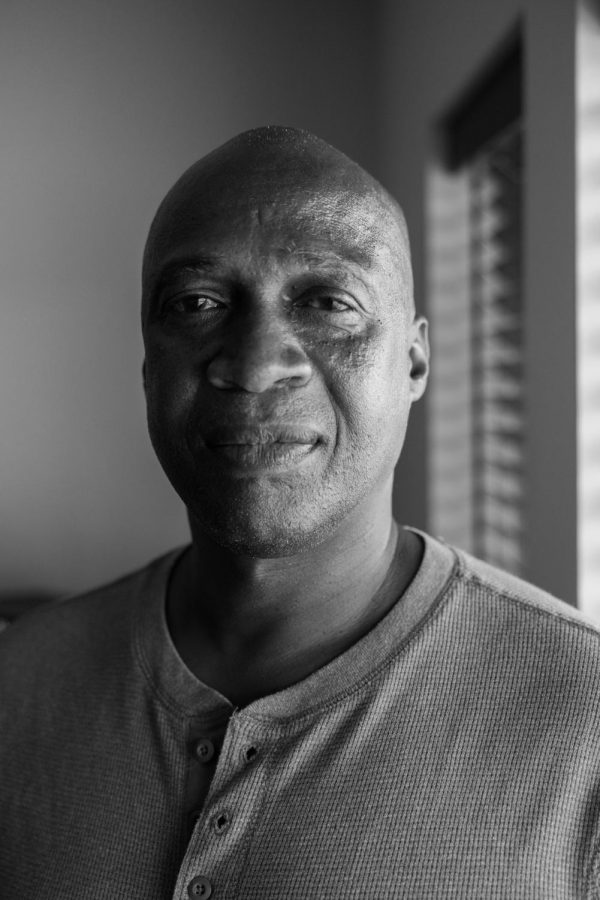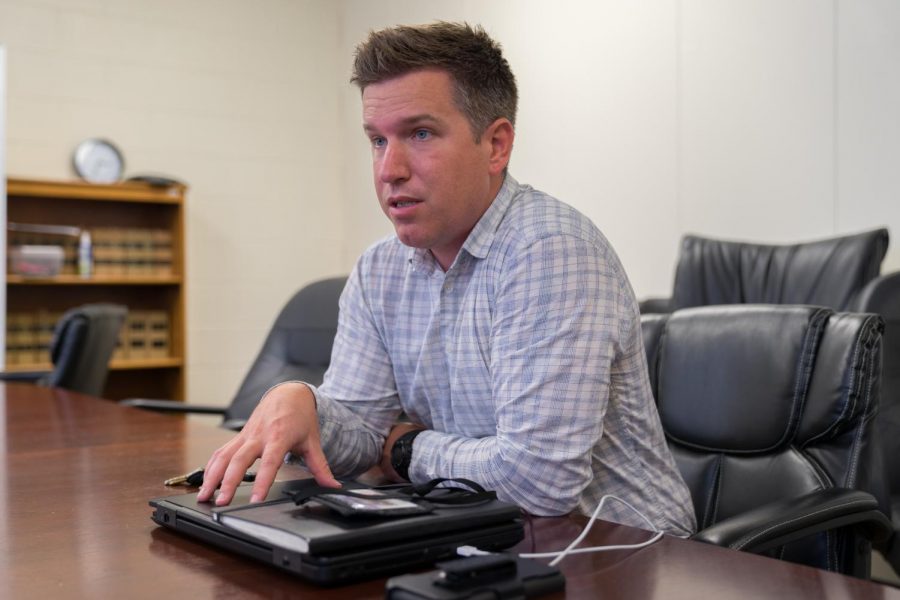I don’t bring anything permanent in during my first year living here.
I keep my clothes to a minimum, enough for a duffel bag. I don’t pack too much food in the freezer. No pictures are on the walls.
It’s a one-bedroom unit on the first floor in a building at 28th Street and Highland Avenue in Milwaukee. When I first walk in, I get to work making fried chicken.
The apartment has a large living room, a small kitchen, a bedroom and bathroom. The white carpeting in the bedroom and living room has recently been shampooed. The shutters for the kitchen window are missing and one of the stove burners does not turn on. Other than that, it’s a nice place to live.
It’s all mine, too. I come and go as I please. I can lock my stuff up and take a shower any time I want. There’s heating and air conditioning, too.
Housing First brings the couch, bed, table and dishes for me. They call it a ‘starter kit’.
My first night here my friend Ronald stays over.
In the early days, I’m never sure when I might have to leave, when I might have to go back to sleeping on the streets.
Freedom in Carver Park
For two years, I stayed in Carver Park. It’s always felt like home.
Ronald and I remember our childhoods there.
The park has a swimming pool with a diving board and 6-foot and 12-foot deep swimming areas. My auntie and cousins live across the street. We watch Fourth of July fireworks from the grass. On hot summer nights, we climb the pool fence and go swimming. We run when the police come by.
The park has changed since we were kids. The swimming pool is gone and now it’s a splash pad. The north side used to be filled with houses, like the one my auntie lived in. Now, there are three baseball fields in their place.
It is a small and friendly park, even today. There are barbecues and music everyday. Beckum-Stapleton Little League has its baseball games on the fields, and other groups play kickball. Mr. James Beckum played for the East St. Louis Giants in the Negro leagues when he was younger. After he stopped playing, he set the fields up for youth baseball teams to use. He’s a good man.
Mr. Beckum comes everyday to look after the fields. He knows a lot of us are sleeping down at the park. He just wants us to be safe. He opens up the bathrooms early to let us wash up. In return, we help him clean up the park.
There’s about five of us in the park, including Ronald. We have QUEST cards we use for food, or we go down to St. Ben’s for breakfast and St. James Cathedral for dinner. On summer nights, I put two picnic tables together, put my sleeping bag down and go to sleep. Other people sleep in the dugouts.
Every morning, I use the bathroom sink to brush my teeth and wash my face. I hide all my stuff in the bushes and head over to Repairers of the Breach, a daytime homeless shelter, to shower and change my clothes.
On the north side of the park, there’s a small building with bathrooms. The heat is left on in the winter, so I sleep in the men’s restroom. Ronald takes the women’s. It’s an interesting situation.
There’s freedom in Carver Park. Not like the shelters from before. I spent previous winters at Milwaukee Rescue Mission or The Guest House — whichever one I can get into.
Trials and Tribulations
Before breakfast, lunch, dinner and even bed, there’s a service you go to at the Rescue Mission. They just push the church on you so much. The staff members talk to you like you’re beneath them, like you are dirt. People come in drunk because they don’t want to deal with the staff.
At night when you shower, your clothes and belongings go in a milk crate. If you put money or valuables in that crate, they are gone. After showering, you can’t wear your own clothes or underwear to bed. Two-hundred men sleeping in hospital gowns with no underwear; but that’s the Mission’s way of doing things. You do it, or you leave.
Guest House is nice. They push you to get a job or go to treatment, but they don’t force you. They give you goals and help you if you want help.
I have a disk in my back that slips out, so it is hard for me to get a job. Most companies do not want to risk an employee getting it and it is hard to get workers’ compensation because it’s a preexisting injury. Though in 2010, I get a job at Quad/Graphics through a temp agency while living between the Mission and the Guest House.
One day as I am heading to work, my back gives out. I go to my boss with my medical records, but they say the job is too stressful and let me go.
I never like the work much, anyways. A couple years before Quad/Graphics, I am a line cook at the Cathedral of St. John’s. I work in a lunch program to feed the homeless and get a lot of compliments from the people who come to eat. It’s my favorite job. I have experience cooking.
At 18 years old, I’m sentenced to 15 years in jail for a robbery on the East side. I did it with some people I go to high school with.
After probation and everything, it feels like 20 years. When you do something that young and you’re black, it follows you for a long time.
I start time at Green Bay Correctional Institution, but they ship me around Wisconsin, between Kettle Moraine, Thompson, Oregon, Winnebago and Waupun. Inmates are expected to do support jobs during their time in prison, like janitorial duties or laundry. I’m a cook, so I make food at all the different locations.
I’m determined not to go back once I leave prison. I don’t have any money and can’t get a job because of my back problems. It’s best to go to shelters or to the streets. Either that or hustle and steal and just end up back in jail.
I’m in a better place now. I can talk about my struggles.
Home
I meet Mary Ann Patti when I’m in Carver Park. She’s from a nonprofit called Community Advocate, the organization that coordinates outreach programs that support the homeless. I tell her my story and she makes a call to Housing First.
Housing First provides funding to find homeless people a permanent place to stay. I have an initial interview with them and afterwards, the interviewers identify that I’m chronically homeless.
A week later, Housing First starts taking me around to look for apartments. It takes only three weeks after the initial interview to get me into the apartment on Highland.
Without Housing First, I would still be living in Carver Park. They brought me into a stable living situation for the first time in my life.
I know I can keep more permanent things in my apartment. A new dresser, a bigger TV, more food and clothes. I know I won’t have to pack it up and leave in a moment’s notice.
I suffer through a heart attack last year and Housing First encourages me to move to a new apartment. It’s in Walker’s Point and on Jan. 1, I move in. It’s where I live now. It’s a lot nicer.
It feels like a permanent home.
I stay healthy and keep up with my medications and doctor visits.
I have a case manager from Community Advocate who come to check on me twice a month. She makes sure I keep my appointments and helps file medical paperwork to determine if I can work again. My back problems keep me from getting a new job, but she helps me fill out vocational rehabilitation forms.
I go back to the park every day to see everyone I know. Ronald, Ty and James. We sit around and barbecue, talk about old times and about the people we haven’t seen in awhile. We just kick it. They’re in housing now, too.
I’m on the advisory board for Housing First. I go to the office every few days. I work with other board members to learn how to help people better. It helps to share my story to help others. I also work with the Police Academy and even went to Madison to talk with Wisconsin Senator Lena Taylor about homelessness.
People are becoming more aware about why people are homeless. I’m getting my story out there. It helps me grow.
We are not bad or evil people. We are just going through the trials and tribulations of life. Some of us get stuck and some of us can move forward. We are all just human beings.
I’m still Jeff Stingely, but I’m more at peace now.
I don’t have to worry about the rain anymore. Last night, I saw a man sleeping outside at the bus stop. It was pouring rain. You just have to say, ‘Lord, look out for that man.’
Just like you looked out for me.



Paul • Nov 14, 2019 at 11:13 pm
Thank you Mr. Stingely, Matthew Harte and Marquette Wire for sharing this inspirational and motivating story. I hope for the best for Mr. Stingely and his friends.